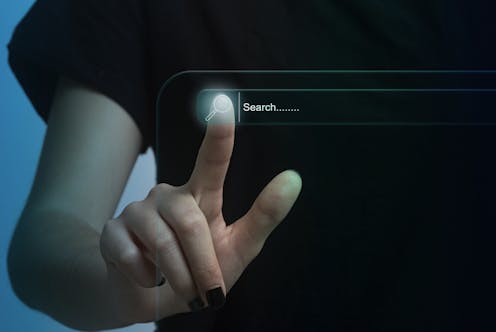AI search tools and chatbots may make NZ news less visible and reliable – new study
- Written by Merja Myllylahti, Senior Lecturer, Co-Director Research Centre for Journalism, Media & Democracy, Auckland University of Technology

Evidence is mounting[1] that the new generative AI[2] internet search tools provided by OpenAI, Google and Microsoft can increase the risk of returning false, misleading or partially correct information.
Despite the implications of this for the news industry and an informed democracy, the New Zealand government has decided to leave AI considerations out of its plans to revive the previous government’s Fair Digital News Bargaining Bill[3].
The proposed law will require Google and Meta (which runs Facebook and Instagram) to pay news companies for their content. While plenty of local news organisations receive money from Google, they don’t receive payments from Meta.
Media and Communications Minister Paul Goldsmith says the proposed bill will have some amendments, but these will not be related[4] to the increasing role of generative AI in news searches. The “broad issue of AI” would be considered later, he says.
However, the bill will give the minister the power to decide which companies will be included under a new law, potentially opening the door to bring the likes of Microsoft and OpenAI to the negotiating table.
How do news companies respond?
AI-powered chatbots such as Google’s Gemini, Microsoft’s Copilot and OpenAI’s ChatGPT respond to user prompts, giving answers based on information “scraped” from the internet, including news media sites. They also use news content – or any content they can find – to “train” their AI models.
As AI companies are struggling to find enough data to do this training, they are making deals with news companies to use their content, including archives, to feed into their models.
Therefore, it is not surprising many big news companies – including News Corp, The Financial Times (owned by Nikkei) and Germany’s Axel Springer – have signed commercial deals for their content with AI companies.
On the other hand, companies such as The New York Times and Alden Global Capital (the second largest newspaper owner in the US) have taken a different approach. They are suing Microsoft and OpenAI[5] for “illegally using news articles to power their AI chatbots”.
Alden says OpenAI and Microsoft use “millions of its copyrighted articles without permission and it uses these to train and feed their generative AI products”.
In 2023, leading New Zealand news publisher Stuff stopped ChatGPT from using its stories to feed its software models. Since then, my new research[6] shows Stuff’s news content has also dropped in visibility in Google’s and Microsoft’s searches.
News diversity is shrinking
I analysed what Microsoft’s and Google’s search engines and their respective chatbots, Copilot and Gemini, offer as news.
In general, search engines return results based on a user’s inquiry, linking to information. Chatbots use large language models[7] to create answers by scraping data from sources, often without any links to information.
The study gathered three months of data in 2023 and again in 2024. Search engines were prompted to offer the “main news in New Zealand today”, and chatbots were asked to provide links and sources to news stories.
The results showed news diversity shrank in Google and Microsoft search. While both search engines offered news from legacy news media outlets, the category “other sources” grew dramatically between 2023 and 2024.
What these AI-powered search engines offer as “news” sources is worrying. They increasingly link to random, non-news sources such as industry forums and press releases.
Furthermore, the Google Gemini and Microsoft Copilot chatbots offered old stories as the main news of the day, did not give links to the specific news stories, and gave no sources in the answers they provided.
Having been asked about the main news in New Zealand today, the search engines were then asked: can you give any sources for the stories? This from Google Gemini was representative of the responses:
I am a large language model, and I am able to communicate and generate human-like text in response to a wide range of prompts and questions. Is there anything else I can do to help you with this request?
As more data is fed into AI-powered searches and chatbots, they may become more accurate. Until then, however, users should be careful about the reliability or independence of information sourced this way.
Democracy, news and AI
Dealing with AI companies has left news organisations in a difficult situation. If they don’t make deals, they may lose potential extra revenue. If they do, there is no guarantee how their content will appear in generative AI search or chatbots.
In May this year, for example, Google confirmed[8] its search engine will offer more AI answers than website links. This means it will provide detailed AI responses to user prompts, and snapshot summaries without linking to any sources of information.
If the links disappear from the AI-generated search responses, it potentially means Google and other providers don’t need to pay news companies for the snippets and links they have been using in their services. This may have implications for the revived Fair Digital News Bargaining Bill.
On the other hand, AI providers are already paying some news companies for their current and archived content to train their chatbots, which could lead to better search results.
How this all plays out will have consequences for democracy as much as for media revenues, which my ongoing research aims to investigate.
References
- ^ mounting (reutersinstitute.politics.ox.ac.uk)
- ^ generative AI (theconversation.com)
- ^ Fair Digital News Bargaining Bill (www.mch.govt.nz)
- ^ not be related (newsroom.co.nz)
- ^ suing Microsoft and OpenAI (www.nytimes.com)
- ^ new research (www.researchgate.net)
- ^ large language models (www.techtarget.com)
- ^ Google confirmed (blog.google)

















